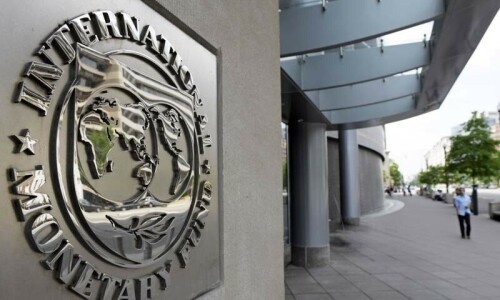BANGKOK, April 1: Outraged poor nations bearing the brunt of global warming have become increasingly bold in UN-led climate talks, but some worry that recent trysts of large countries are leaving them out in the cold.
A grouping of 192 countries under the United Nations is leading the way in negotiating a groundbreaking climate change treaty, and most of its members are currently in Bangkok to try to hammer out a two-year work plan.
The meeting comes soon after the United States chaired a meeting of 16 nations most responsible for global warming, and ahead of a special climate summit on the sidelines of the G-8 summit of rich nations.
“We haven’t been invited to either of those processes,” said Espen Ronneberg, a Samoa-based climate change adviser to the Association of Small Island States, on the sidelines of the Bangkok talks.
“We need to have a global consensus on climate change, so to have a separate process that is not completely inclusive is not that helpful.” While major developing nations such as China and India are part of the big initiatives, the Group of 77, a bloc of developing nations, said it had not been invited.
“The balance has to come from everybody, all the representative groups, being around the table. Not specialised specific groups which have almost the same purpose – that’s a problem,” said Byron Blake, deputy representative to the United Nations of current Group of 77 chair Antigua and Barbuda.
The world has until 2009 to draft a new pact on battling global warming, which should come into force by 2012, when current Kyoto Protocol targets for rich nations to slash greenhouse gas emissions expire.
A report by the world’s leading climate scientists last year warned that drought, floods and storms will increase as global temperatures rise, putting the health of millions at risk and hitting the poor countries hardest.
As they see climate change begin to affect their environments and economies, impoverished nations are becoming more confident and vocal, said Antonio Hill, policy adviser to development group Oxfam.
“There is a very dramatic difference between this year and last year in the negotiations versus 10 years ago or even five years ago,” he said.
Developing countries want the rich world to commit to the most ambitious cuts in greenhouse gas emissions which trap the sun’s heat and cause global warming and pledge to transfer ‘green’ technologies and fund climate change-battling initiatives in poorer countries.
Many rich nations led by the United States, however, are pressing for developing countries also to commit to slashing emissions. They argue that the lines have blurred between rich and poor nations, with China expected soon to be the world’s top emitter.
US President George W. Bush launched his own climate initiative gathering 16 large nations responsible for 80 per cent of harmful emissions, which met two months ago in Hawaii.
Japan, meanwhile, will hold separate talks on the sidelines of the G-8 meeting in July, and has invited Australia, Brazil, China, India, Indonesia, Mexico, South Korea and South Africa to join the G-8 nations.
In mid-March, Japan hosted a 20-nation climate meeting in suburban Tokyo.
The UN’s climate chief Yvo de Boer told AFP that the new initiatives could be very constructive, so long as they feed back into the UN-led efforts.
“The (US-led) major economies process and the outcome of the G-8 meeting last year very clearly recognises that there is only one place where the real negotiations happen and that’s the (UN) Convention on Climate Change,” he said.
Mr Blake urged big polluters to listen to all of the voices from the developing world, rather than focus on exclusive sideline initiatives.
“It is almost a defensive move by a club of people who have been the cause of the major problems,” Mr Blake told AFP.








































Dear visitor, the comments section is undergoing an overhaul and will return soon.